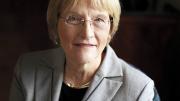During his Commencement Day address to the senior class in 2001, the Reverend Peter Gomes shared a New Yorker cartoon featuring two scientists standing together at a lab bench. “Sometimes,” one scientist remarks to the other, “I wonder if there is more to life than unlocking the mysteries of the universe.” That same year, a team of researchers from Harvard, Stanford, Caltech, and the University of Minnesota—led by Harvard associate professor of astronomy John Kovac—began doing exactly that, searching for evidence of cosmic inflation, a pivotal moment in the Big Bang. This March, they gathered at the Harvard Center for Astrophysics and shared their breakthrough discovery with the world, expanding our knowledge of the universe’s very beginnings and reminding the world of the wonder of discovery, memorably described by Professor Kovac as a “mixture of awe and elation.”
Of what use is astronomy? In 1880, Asaph Hall, discoverer of the moons of Mars and erstwhile researcher at the Harvard College Observatory, asked that question while addressing the annual meeting of the American Association for the Advancement of Science. The chief value of the growing field was not, in his estimation, to be found in its “great benefits on navigation and on commerce,” but in “the spirit of honest, unrelenting criticism, and impartial examination” that it embodied and encouraged. Working in what Hall described as “the region of ideas and invention” satisfies a fundamental fascination with knowing more about ourselves and the world we inhabit, and leads to new insights and useful outcomes that we cannot predict. Yet if Hall’s question was posed to policymakers today I fear we’d hear a one-sided answer. Federal investment in basic research has declined sharply, from an estimated $40 billion in 2009 to $30 billion last year, and budget cuts continue to hamper research efforts in many fields. Limiting the scope of human inquiry will forestall human progress, stunting the growth of new branches on the tree of knowledge before we can see what fruits they might bear.
Similar problems are emerging in research areas with the potential to generate knowledge with more immediate applications. Just a few days after the Big Bang discovery was announced, a team of Harvard Medical School researchers led by professor of genetics and neurology Bruce Yankner published a study on a protein—known as REST—that appears to protect the aging brain, a finding that may revolutionize treatments for Alzheimer’s disease and other forms of dementia. This groundbreaking research could have gone even further toward clinical applications if it had received additional support from the National Institutes of Health, but the squeeze of sequestration led to limited funding.
At a moment filled with opportunities, the nation seems to be reconsidering the merits of supporting science; we will feel the deleterious effects of budget cuts for generations. Imagine if the National Science Foundation had not helped fund the construction of the telescopes used by Professor Kovac and his colleagues, if the National Institutes of Health had not supported the Human Genome Project that enabled Professor Yankner and the members of his lab to identify genes that cause changes in the aging brain. We would know less about ourselves, about the wonders of the universe, and about the mechanisms that sustain life.
Curiosity and inquiry lift the shroud of humanity’s ignorance, allowing us to glimpse deeper understandings and to ask—and answer—new questions. The desire to understand is among humanity’s most beautiful capacities, and it is the wellspring from which innovations flow. We must continue to reaffirm the importance of science and the indelible connection between ideas and invention, recognizing the moments of awe and elation that encourage us to push on the frontiers of knowledge and seek the next horizon.
Sincerely,
Drew Faust









